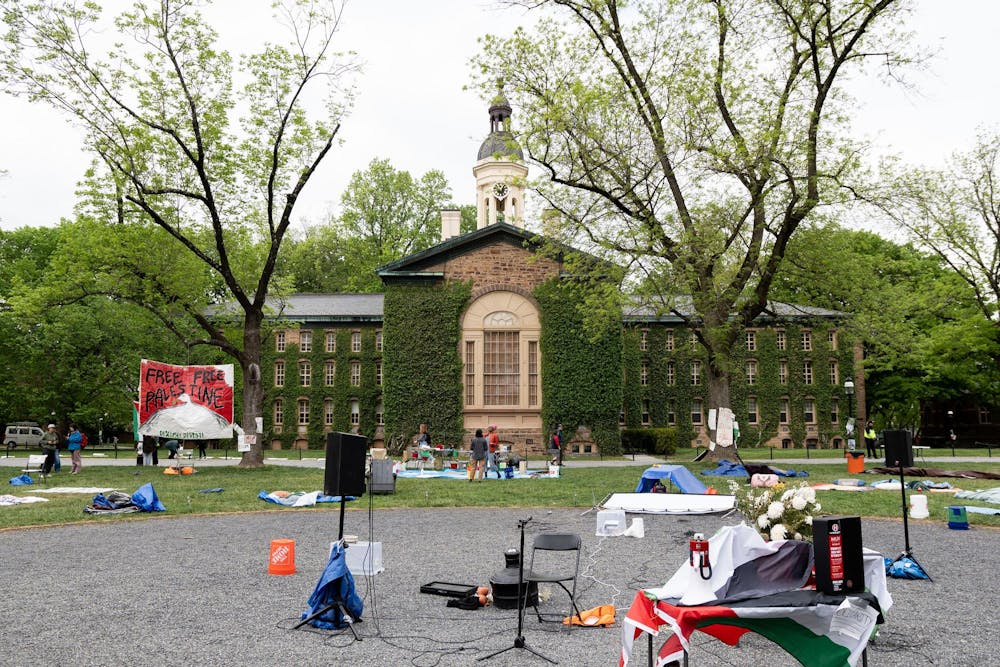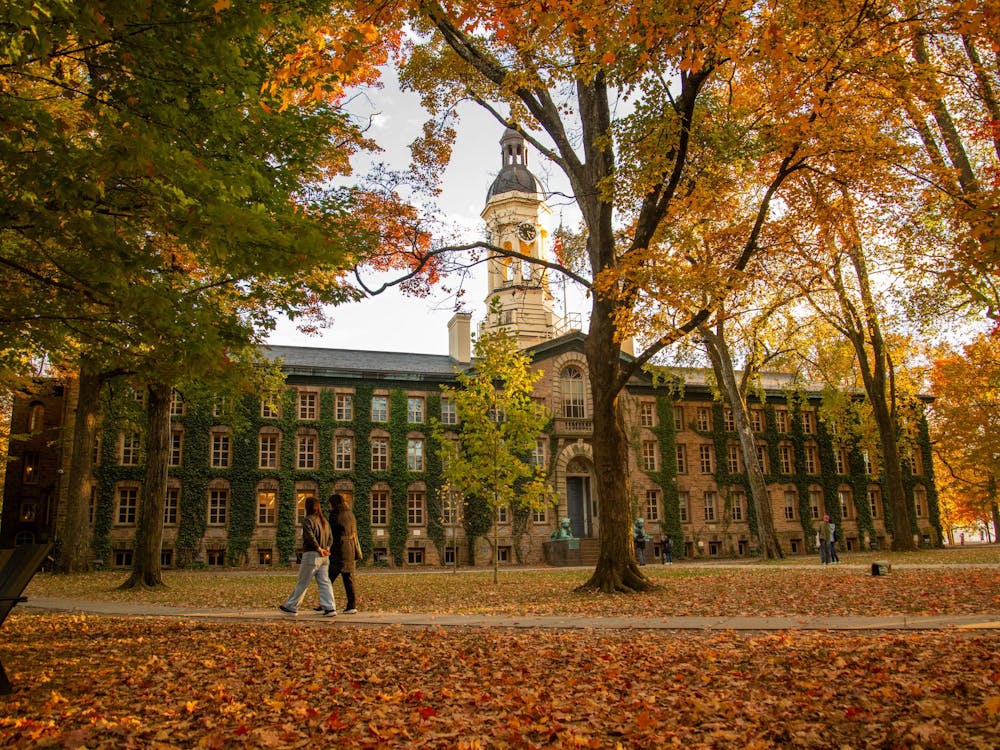A group of students, faculty, alumni, and postdocs met with University President Christopher Eisgruber ’83, Dean of the Graduate School Rodney Priestley, and Dean of the School of Public and International Affairs Amaney Jamal on Monday, May 6 at 11:30 a.m. to discuss the demands of the ongoing sit-in on Cannon Green.
The students’ demands, which have been public since the beginning of the sit-in on April 25, include divestment from Israeli companies and American military funding, an academic boycott of Israeli universities, the cultivation of ties with Palestinian academic institutions, and the creation of a center for Palestinian studies with scholarships for people displaced from Gaza.
Multiple students present at the meeting told the Daily Princetonian that Eisgruber declined to meet any of their demands.
“We simply presented these demands and Eisgruber gave us nothing,” Emanuelle Sippy ’25, one of the students present at the meeting, said during a speech on Cannon Green at around 2:30 p.m.
University Spokesperson Jennifer Morrill wrote in a statement to the ‘Prince’ that “University officials were receptive to the possibility of strengthened academic ties with Palestinian institutions and the establishment of an affinity space for Palestinian students.”
The meeting with Eisgruber — the first publicly reported instance of administrators meeting with students over divestment from Israel since the events of Oct. 7 — comes amid a student-led hunger strike that is now on its fourth day. Strikers had demanded a meeting with administrators regarding divestment, as well as the dropping of criminal and disciplinary charges against the two students arrested for erecting tents on Thursday, April 25, and the 13 students arrested for trespassing during the occupation of Clio Hall on Monday, April 29.
Despite the Monday morning meeting with Eisgruber, the strike will continue.
“We feel deeply disrespected by the University administration, Eisgruber specifically, and we will continue to strike until our demands are met,” David Chmielewski ’24, one of the strikers, told the ‘Prince’ on Monday afternoon.

At least 15 students were still striking as of Sunday night, some staying at the sit-in amidst intermittent rain and dropping temperatures.
“All [Eisgruber] could talk about was process,” said Jessica Ng, a postdoctoral research scholar. “The urgency of the situation goes beyond the existing processes. We want to work with him, we want to work with the administration on other processes that are accountable to the urgency of the situation, to the hunger strike, to the encampment, to the ongoing genocide.”
Morrill noted, “President Eisgruber explained that at Princeton, divestment is rare and only considered as part of an orderly process that includes input from across the community. Divestment at Princeton also requires a formal determination that campus consensus is possible on the issue.”
According to Morrill, Eisgruber invited protesters to engage in this formal divestment process, and mentioned that, “A 2014 petition calling for divestment from Israel did not meet the dissociation standard at Princeton.”

According to a December 2014 report of the Resources Committee — a committee within the Council of the Princeton University Community — 71 tenured faculty members submitted a petition to Eisgruber calling for the University to “divest from all companies that contribute to or profit from the Israeli occupation of the West Bank until the State of Israel complies with UN Resolution 242, ends its military occupation of the West Bank and lifts its siege of Gaza.”
Following this petition, a counter-petition signed by over 450 students was submitted to Eisgruber, “reject(ing) efforts — such as boycott, divestment, and sanctions campaigns — that aim to demonize or assign absolute blame to either Israelis or Palestinians as they are counterproductive and drive the parties further away from compromise.” Another petition opposing the original petition, which was signed by officers of the Center for Jewish Life and more than 425 faculty, parents and alumni, was also submitted to Eisgruber.
The Council of the Princeton University Community Resource Committee declined to consider divestment due to a lack of campus consensus in 2014.
Morill called the meeting “productive,” and said that a follow-up meeting was “discussed.” “The president and deans listened to the protestor’s demands,” she wrote. Another speaker at a town hall at approximately 6:30 p.m. said that the University did not agree to an additional meeting.
“We’ve submitted requests through every formal and procedural channel, spending the past eight months on petitions, protests, attending CPUC meetings, and countless requests by students and faculty to meet,” said Patrick Jaojoco GS, another one of the students present at Monday’s meeting, calling the meeting “a scrap of nothing that we refuse to accept.”
Eisgruber also told protesters about “the need for accountability for isolated incidents in which University rules and laws were broken, such as the brief takeover of Clio Hall on April 29,” Morrill wrote.
According to Morrill, Eisgruber said, “I hope the protestors will look for common ground … They are a part of this community and we want to find ways to move forward together.”
Eisgruber acknowledged the meeting publicly in an email to undergraduates at 9:36 a.m. on Tuesday, May 7, noting, “My colleagues and I are now in direct conversation with the protestors. I have told them that we can consider their concerns through appropriate processes that respect the interests of multiple parties and viewpoints, but we cannot allow any group to circumvent those processes or exert special leverage.”
At other colleges around the country, meetings with administration have also failed to reach a resolution. At the University of Chicago, organizers met with administrators and said that negotiations about the encampment were not discussed. At the University of Wisconsin-Madison, protesters had a meeting with administrators, but could not reach a decision.
Miriam Waldvogel is an associate News editor and the investigations editor for the ‘Prince.’ She is from Stockton, Calif. and often covers campus activism and University accountability.
Olivia Sanchez is an associate News editor for the ‘Prince.’ She is from New Jersey and often covers the graduate school and academic departments.
Please send any corrections to corrections[at]dailyprincetonian.com.
Editor’s note: This piece has been updated to include a quote from Eisgruber’s email which was sent out on Tuesday, May 7.








